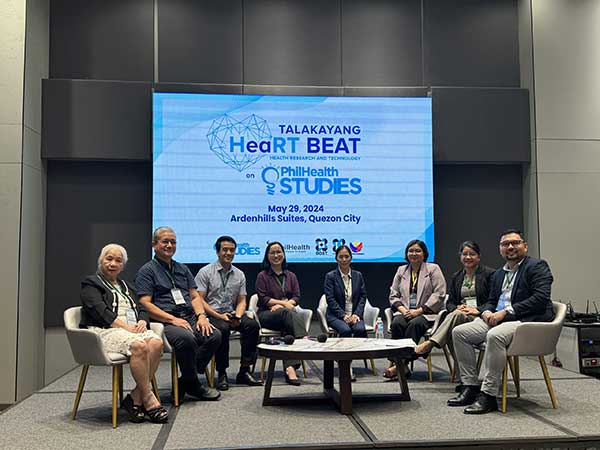
Aiming to extend access to a full range of quality health services to more Filipinos, the Department of Science and Technology – Philippine Council for Health Research and Development (DOST-PCHRD) along with the Philippine Health Insurance Corporation (PhilHealth), showcased three studies during a Talakayang HeaRT Beat press conference in Quezon City.
“In advancing health science initiatives, we invest in building stronger and healthier Filipino communities. We at the DOST remain dedicated in supporting the research needs of PhilHealth to sustain the implementation of healthcare policies that are inclusive and attuned to the needs of our people.” said DOST Secretary Renato U. Solidum, Jr.
The study from the University of the Philippines Manila led by Dr. Corazon Ngelangel, entitled, “Protecting Against Financial Catastrophe: Evaluation of the Z Benefits in Providing Financial Risk Protection and Improving Clinical Outcomes,” recommended the expansion of the Z Benefit Package to cover more diseases and improve coverage during critical periods of the illness, include quality of life measures in monitoring surveys of patients, and intensify information dissemination to patients and healthcare providers.
To streamline reimbursement for inpatient care by setting fixed payment rates, PhilHealth introduced the All Case Rates (ACR), a policy initiated in 2013 as a product of the project entitled “All Case Rates Review and Assessment,” led by Dr. Fernando Garcia of UP Manila.
Findings of the study revealed that the number of PhilHealth beneficiaries among the indigent members declined and claims from the informal economy and sponsored beneficiaries continued to rise, hence the implementation of ACR.
The project team cited that the decline in membership enrollment, especially among the indigent population, poses a significant obstacle to achieving universal coverage objectives.
Furthermore, issues with verifying membership statuses raise additional concerns about the integrity of the system.
Meanwhile, the project entiled “Development of a Diagnosis Related Group-System Based Global Budget Payment Mechanism” led by Dr. Karlo Paredes of Alliance for Improving Health Outcomes, Inc. (AIHO) highlighted the need to shift the provider payment for inpatient care to a case-based payment system that categorizes patient cases by clinical variables, called Diagnosis Related Group (DRG)-system based Global Budget Payment (GBP).
These three (3) projects are products of the ongoing partnership between DOST-PCHRD and PhilHealth since 2015, called the PhilHealth STUDIES (Supporting the Thrust for UHC through Data, Information, and Knowledge-Exchange Systems) Program, which provides funding for research and development projects and other related activities aligned with the PhilHealth Research Agenda.
On behalf of Dr. Edwin M. Oriña, Ms. Wanda Villar of the PhilHealth Corporation expressed his appreciation of the collaborative projects between DOST-PCHRD and PhilHealth.
“Nais ko pong pasalamatan ang DOST-PCHRD, sa kanilang pakikipagtulungan para maibigay ang benepisyong pangkalusugang sapat at de-kalidad para sa lahat.”





















